Many people want to ensure that their carb intake remains low but what does that mean for those of us who love whiskey. I decided to research exactly how many carbs there are in whiskey and here’s what I found:
There is 0.1g of carbs in 100ml of whiskey. This is because all the carbs in the ingredients used to make whiskey are removed during the whiskey making process. The miniscule amount of carbs whiskey does have comes from sugars in the wood of the barrels the whiskey is matured in and / or any caramel coloring added during bottling.
This article will give more context to the number of carbs in whiskey and go into more detail about why there are so few and why you might have expected whiskey to contain more carbs than it does. This will make it clear why when also considering the issue of calories, zero carbs in whiskey can still be a problem.
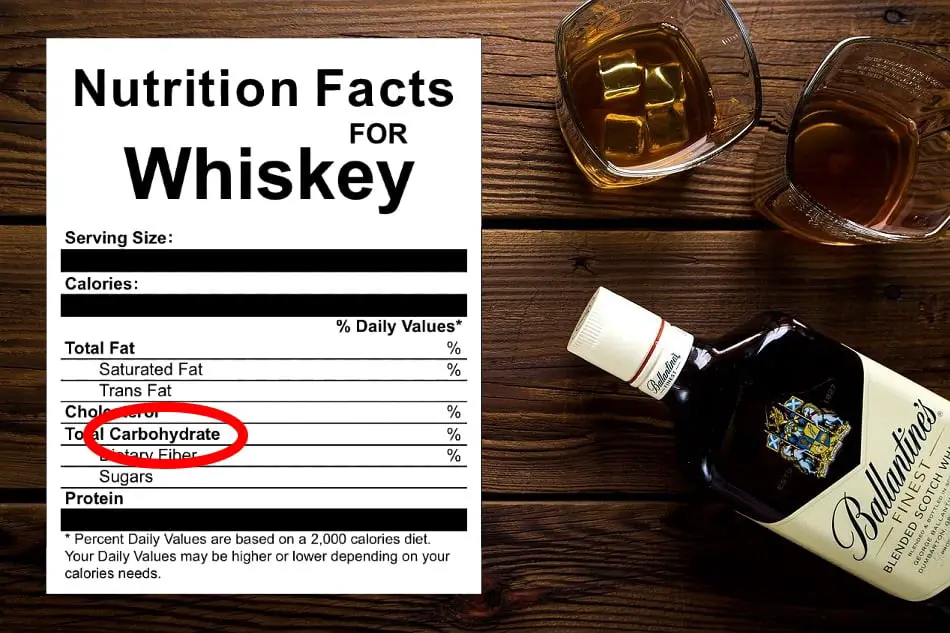
The Number of Carbs in Whiskey
There is 0.1g of carbs per 100ml of whiskey.
To understand this number better, we need to give it some context.
The standard pour for a neat glass of whiskey is 2fl oz / 59.15ml and the standard pour for a shot of whiskey is 1.5fl oz / 44.36ml. Using the above ratio, a glass of whiskey has 0.06g of carbs and a shot of whiskey has 0.04g of carbs, so hardly any carbs at all.
And considering things in terms of a bottle of whiskey doesn’t make things that much worse. A 750ml bottle of whiskey has 0.75g of carbs and a 1L bottle has 1g of carbs.
To give this even more context, here’s a table showing the number of carbs in other common foods and drinks of normal portion size.
| Grams of Carbs | |
|---|---|
| Cup of coffee – 6fl oz | 0g |
| Serving of tuna – 85g | 0g |
| Portion of meat – 100g | 0g |
| Portion of chicken – 100g | 0g |
| Slice of cheddar cheese – 28g | 0.4g |
| Large, boiled egg – 50g | 0.6g |
| Hot dog – 52g | 2.2g |
| 1 Graham Cracker – 7g | 5g |
| 1 chocolate chip cookie – 16g | 9g |
| Slice of white bread – 25g | 12g |
| Cup of 1% fat milk – 8fl oz | 12.6g |
| Serving of pasta – 57g | 14g |
| Serving of vanilla ice cream – 66g | 16g |
| Glass of coca cola – 8fl oz | 23.2g |
| 1 medium apple – 182g | 25g |
| Cup of orange juice – 8fl oz | 25.6g |
| 1 jelly doughnut – 85g | 33g |
| Slice of pizza – 107g | 36g |
| Medium sized baked potato – 173g | 37g |
| Cup of white, long-grain, cooked rice – 158g | 45g |
As you can see, while some common foods and drinks have absolutely zero carbs and others, like whiskey have only a miniscule amount of carbs, a lot of the things we consume have a great deal more.
You’d have to drink a lot of whiskey before you took in a significant amount of carbs. For example, you’d need to drink more than 83 glasses of whiskey to consume the same number of carbs as a Graham Cracker, and as that amount of whiskey is usually drunk over a much longer period of time than it takes to eat a Graham Cracker (if you’re normal), those 5 carbs shouldn’t be a problem.
The number of carbs in whiskey also compares favorably with other alcoholic drinks:
| Grams of Carbs | |
|---|---|
| Brandy | 0g |
| Rum | 0g |
| Vodka | 0g |
| Gin | 0g |
| Wine 12%ABV – 5fl oz | 4g |
| Beer 5%-7%ABV – 12fl oz | 12g-15g |
As you can see, other spirits have even less carbs than whiskey (for reasons that will become clear) whereas wine and beer have a lot more. This gives whiskey the nutritional advantage over wine and beer – for the moment.
Why There Are So Few Carbs in Whiskey
It’s actually quite surprising that whiskey has so little carbs because unlike foods and drinks that are naturally free of carbs, whiskey is made from ingredients that are high in carbs.
The three ingredients of whiskey are:
- Water
- Yeast
- Grain
Water has zero carbs, yeast is about half carbs and grains are mostly carbs. It takes (using a very rough estimate) about 3g of yeast and 1kg of grain to make a 750ml bottle of 40%ABV whiskey. With about 1.2g of carbs from the yeast and 750g of carbs from the grain, the ingredients to make a bottle of whiskey contain a lot of carbs, so you may have expected the finished product to be high in carbs too.
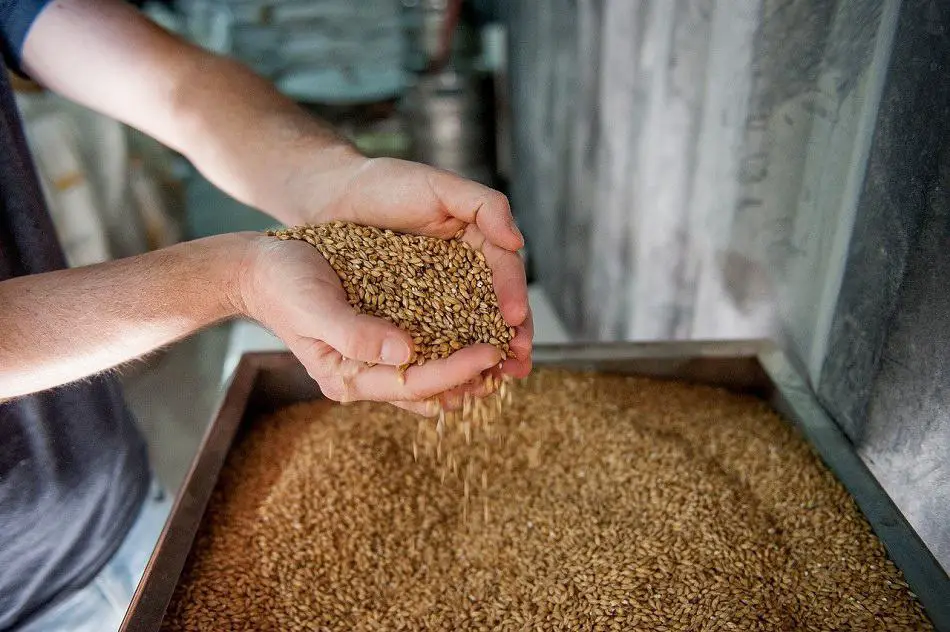
The reason why this is not so, is because carbs from the ingredients are all removed during the fermentation and distillation stages of the whiskey making process.
During fermentation, sugars which are carbs, that were extracted from the grain’s starches which are also carbs, are mixed with yeast to convert them into alcohol which are not carbs. Since most of the carbs in grain are starches, by this point in the whiskey making process most of the carbs will have been removed by being converted into alcohol.
The remaining non-starch carbs in the grain and yeast are removed during the distillation process. This is when the alcohol is vaporized so that it can be concentrated and condensed, but this also separates it from everything else including the remaining carbs.
Where the Miniscule Amount of Carbs in Whiskey Comes From
Fermentation and distillation removes all the carbs that come from the ingredients, but whiskey still has a minuscule amount of carbs because a small amount is added during the maturation and bottling stages of the whiskey making process.
Maturation is when distilled alcohol is placed into barrels and stored for years or even decades so that the wood of the barrels can transmit different and intricate flavors to the whiskey.
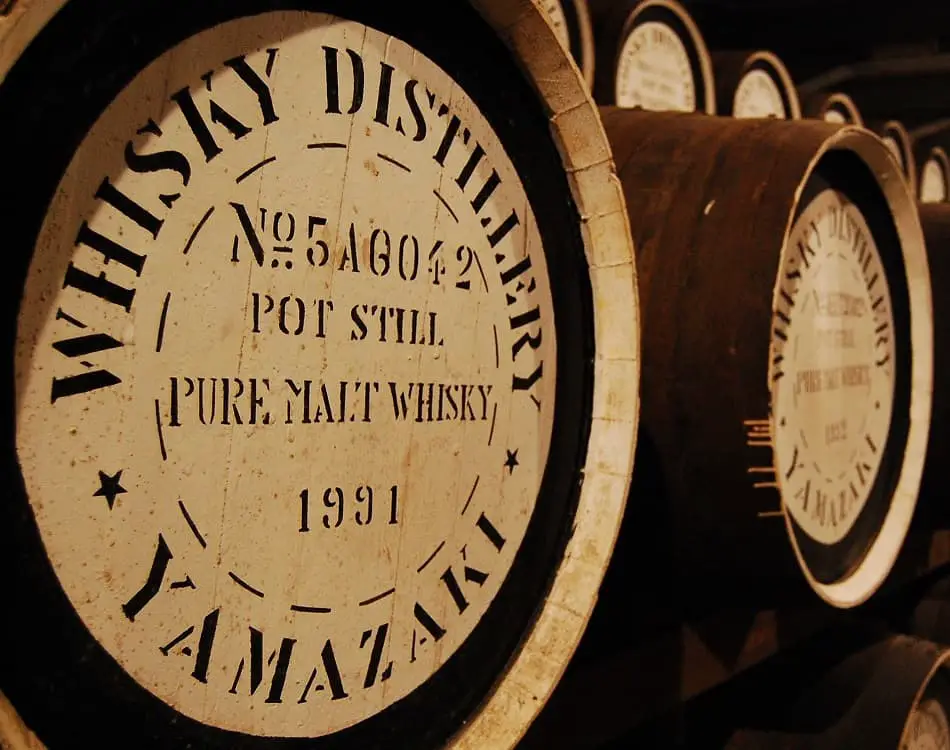
Sometimes the barrels are toasted or charred to open up the wood and make it easter for the flavors to be extracted, but since the heat also converts the hemicellulose in the wood into sugars – which are carbs, that will also be transferred to the whiskey.
During bottling some distillers add caramel coloring also known as E150 of which there are four types: E150a – E150d. This is done to ensure a consistency of color between whiskeys that come from different casks and because darker whiskeys are perceived as older. Caramel coloring is made by burning sugars which are carbs, so adding it to whiskey also adds carbs.
However, not all whiskeys are matured in toasted or charred barrels and not all whiskeys contain caramel coloring. Some whiskeys are not matured in toasted or charred barrels and also don’t contain caramel coloring and will therefore have zero carbs.
Whiskeys that are matured in toasted or charred barrels or that contain E150 still only have miniscule amounts of carbs as only small amounts of sugars are transferred from the wood of the barrels even if the whiskey is matured for decades, and only a small amount of caramel coloring is ever added to whiskey. That’s why although whiskey does have carbs it’s only a miniscule amount.
This is also why other spirits like brandy, rum, vodka and gin have even less carbs than whiskey. Like whiskey they are also distilled, so any carbs from the ingredients are removed but unlike whiskey, not even a small amount of carbs are added afterwards.
Beer and wine on the other hand have more carbs than whiskey because while they’re also made by fermenting sugars (beer is made by fermenting sugars from cereal grains, and wine is made by fermenting the naturally occurring sugars in grapes), they’re not distilled. Any sugars not converted into alcohol during fermentation will remain in the finished product and be a source of carbs.
Why Whiskey’s Zero Carbs Can Still Be a Problem
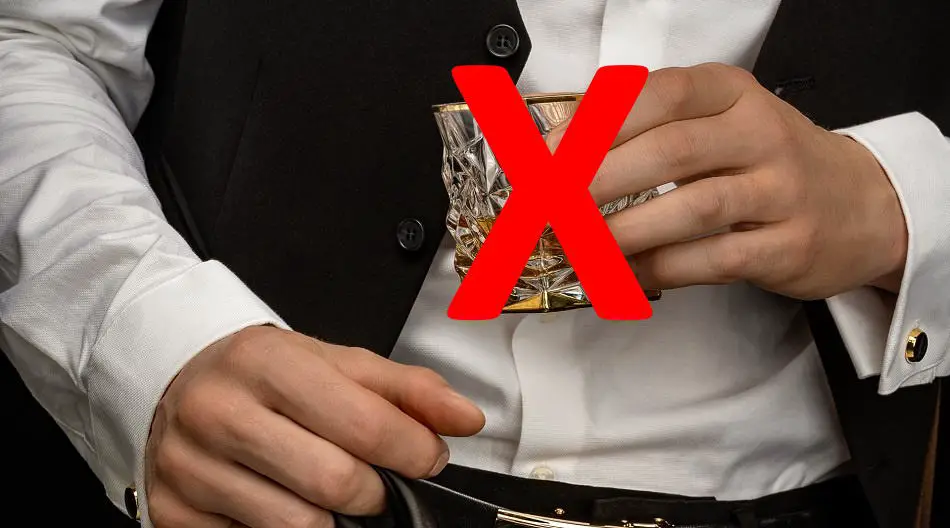
Now you might expect that zero carbs in whiskey would be a good thing, however, it can still be a problem.
This is because, as mentioned, the only reason whiskey has so few carbs is because they’re all removed during the whiskey making process and because most of that removal occurs by converting the carbs into alcohol.
This means that most of the carbs in whiskey haven’t really been removed. They’ve just been transformed into something else and remain in the whiskey in a different form.
Now this may not be a problem at all. There are many reasons to avoid carbs and if they’re converted into alcohol that may be good enough. However, if you want to avoid carbs because it’s a source of calories, then their being converted into alcohol is not going to help, because alcohol is a source of calories too.
In fact, it could make matters worse because carbs contain 4 calories per gram, whereas alcohol contains 7 calories per gram! There’s no point celebrating the fact that whiskey has almost zero carbs when the whole point of the whiskey making process is to convert them into alcohol which contains almost twice the number of calories per gram!
Fortunately, the problem is not that bad, firstly because some carbs are actually removed and secondly because although most of the carbs in grains are starches (the type of carb that contains sugars which can be converted into alcohol), 1g of starch doesn’t convert into 1g of alcohol and therefore more calories.
In fact, I calculated how many grams of starch it takes to make a glass of whiskey with the standard neat pour of 2fl oz / 59.15ml, and how many grams of alcohol it contains.
(To find the number of grams of starch, I used the above-mentioned rough estimate of 1kg of grain to make a 750ml bottle of 40%ABV whiskey in which there are 12.68 glasses with a standard neat pour, and an average of 64.3g of starch per 100g of the most commonly used grains. To find the number of grams of alcohol, I multiplied the volume with the ABV divided by 100 and the density of alcohol – 0.78924 g/ml.)
It turns out that a glass of whiskey with the standard neat pour of 2fl oz / 59.15ml is made with 51g of starch and has 18.67g of alcohol. So starch converts to almost a third of the amount of alcohol and because the number of calories in alcohol (7) is not even twice the number of calories in starch (4) you end up with less calories from the alcohol than you would have had from the starch / carbs.
In other words:
51 x 4 = 204 calories in the starch used to make a glass of whiskey
becomes
18.67 x 7 = 131 calories from the alcohol in a glass of whiskey
So it’s not as bad as it could have been (204 calories), but it’s also not as good as ‘zero carbs’ sounds. If you’re considering the number of carbs in whiskey because of its calories, then zero carbs is still a problem because the ex-carbs still exist, albeit in a different, lower-calorie form.
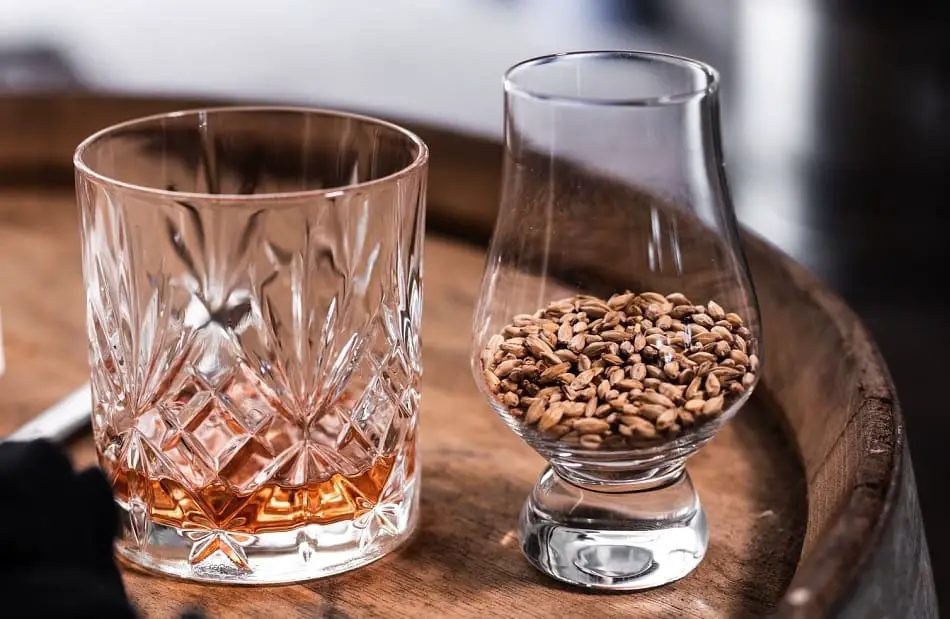
This also means that although it seemed earlier that whiskey had the nutritional advantage over wine and beer for having zero carbs instead of 4g and 12g-15g of carbs respectively, for those considering carbs because of calories and now adding those from the alcohol, that advantage disappears.
This is because a standard glass of wine (5fl oz of 12%ABV) has between 122-129 calories in total (non-converted carbs and alcohol) which is less than the 131 calories in a standard glass (2 fl oz) of 40% whiskey. And if the ABV of the whiskey is more than 40%, the number of calories will be more too.
A regular beer (5%ABV and 12fl oz) has 156 calories in total (non-converted carbs and alcohol), so a glass of whiskey (until about 48%ABV) will still have the nutritional advantage but nowhere near as much as previously thought when we only took carbs into account.
(You can find more information about the number of calories in whiskeys with different ABVs, in a detailed article I wrote about it here.)
The Number of Carbs in Whiskey Cocktails
So far, we’ve been talking about the number of carbs in whiskey by itself but of course, if you add anything to it or are drinking a whiskey cocktail, if the added ingredients contain a lot of carbs, then so will your whiskey. This will be a problem even for those who are only interested in the number of carbs in whiskey.
The following table shows some of the most popular whiskey cocktails, a common serving size and the number of carbs that come from the non-whiskey ingredients.
| Number of Carbs | |
|---|---|
| Scotch and Soda – 116ml | 0.04g |
| Rusty Nail – 74ml | 0.4g |
| Sazerac – 56ml | 2.7g |
| Rob Roy – 64ml | 3.02g |
| Old-Fashioned – 60ml | 4.21g |
| Mint Julep – 65ml | 4.21g |
| Manhattan – 78ml | 4.3g |
| Irish Coffee – 240ml | 4.71g |
| Hot Toddy – 116ml | 6.8g |
| Whiskey Sour – 105ml | 13.89g |
| Jack and Coke – 180ml | 15g |
| 7 and 7 – 211ml | 16.46g |
As you can see, some whiskey cocktails still have only a miniscule amount of carbs but others have a still small but not insignificant amount of carbs. Some whiskey cocktails have quite a lot of carbs and if you’re not careful your whiskey drink could be the equivalent of eating your daily ration of ice cream.
